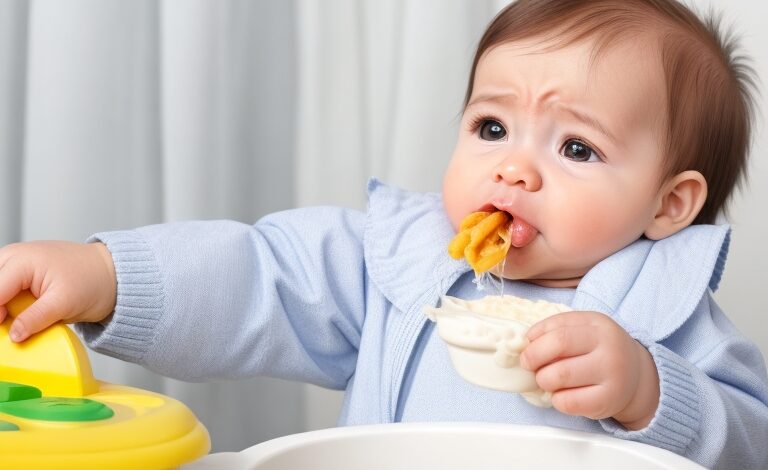Understanding Why Babies Sometimes Won’t Burp After Feeding: Causes, Solutions, and FAQs Explained
Cracking the Code: Why Babies Resist Burping After Feeding

I. Introduction
Burping after feeding is not just a trivial matter; it plays a crucial role in a baby’s comfort and digestive health. As a parent or caregiver, concerns may arise when your little one doesn’t burp after meals. In this article, we will delve into the significance of burping for babies, explore the reasons why some babies struggle to burp, identify signs of an unburned baby, and discuss the potential consequences of inadequate burping. Read more Why Sometimes baby won’t burp after feeding.
1. Babies and Burping: Why It Matters
Burping is more than just ensuring your baby doesn’t have discomfort. It is a process that helps release excess air from their tiny tummies, preventing issues like colic, gas, and reflux. By promoting proper digestion, burping after feeding can also reduce the likelihood of spit-up or vomiting. It is an essential practice that contributes to a baby’s overall well-being.
2. The Mystery Behind Unburped Babies
It can be perplexing when your baby doesn’t burp despite your best efforts. Several factors can contribute to babies not burping. Some infants have a strong gag reflex, making it difficult for them to produce a burp. Additionally, a baby’s immature digestive system and the position in which they are fed can also play a role in preventing burps.
3. Signs and Symptoms of an Unburped Baby
Recognizing indications that your baby hasn’t burped properly is crucial. A gassy or fussy baby after feeding might be a sign that they have not released trapped air through burping. This can lead to discomfort and restlessness, affecting their sleep patterns. In some cases, inadequate burping can also contribute to colic or reflux.
II. Exploring the Causes of a Baby Not Burping
Understanding the underlying factors that can hinder a baby’s ability to burp is essential in finding effective solutions.
1. Feeding Techniques and Positions
The way you feed and hold your baby can significantly impact their ability to burp. Experimenting with different feeding positions, such as the traditional over-the-shoulder technique or the upright position, can help facilitate the release of trapped air. Additionally, ensuring that your baby is latched properly while breastfeeding or using the correct nipple flow for bottle feeding can also improve burping.
2. Baby’s Age and Development
A baby’s age and developmental stage can affect their ability to burp. Younger infants may have a harder time burping due to their immature digestive system, while older babies who have started solid foods might require more aggressive burping techniques. As a baby grows, their sphincter muscles also strengthen, making it easier for them to burp.
3. Medical Conditions and Reflux
Certain health conditions can hinder a baby’s ability to burp. Gastroesophageal reflux (GER) is a common condition in infants that can cause excessive spitting up and make burping more challenging. Other medical conditions such as tongue-tie or food allergies can also contribute to difficulties in burping.
III. Solutions and Techniques to Help Babies Burp
When your baby is struggling to burp, there are practical strategies that can alleviate the issue.
1. Patience and Persistence
To effectively help your baby burp, patience is key. It is important to understand that every baby is different, and it may take time for them to find their burping rhythm. Being persistent in your attempts to burp your baby, even if they don’t initially respond, can eventually lead to success.
2. Massage and Gentle Movement
Massage and gentle movements can aid in burping by stimulating the release of trapped air. Gently rubbing your baby’s back or tummy in circular motions or using the “bicycle legs” technique can help relieve gas and promote burping. Experimenting with different movements and finding what works best for your baby is crucial.
3. Seeking Support: Pediatrician and Lactation Consultant
If your baby consistently struggles to burp or experiences discomfort after feeding, it is important to seek guidance from professionals such as pediatricians or lactation consultants. They can provide personalized advice and suggestions tailored to your baby’s specific needs. Additionally, they can help identify any underlying medical conditions that may be contributing to the issue.
IV. Summary and FAQs (baby won’t burp after feeding)
1. Summary: Why Babies Sometimes Don’t Burp After Feeding
In summary, babies sometimes fail to burp after feeding due to various factors such as feeding techniques, a baby’s age and development, and underlying medical conditions. It is crucial to address the issue to prevent discomfort, gas, and reflux. By being patient, utilizing massage and gentle movements, and seeking support from professionals, you can promote effective burping and ensure your baby’s comfort and digestion.
2. FAQs: Common Questions About Babies Nothing
- Is it harmful if my baby doesn’t burp after feeding? While is important to promote burping for a baby’s comfort and digestion, occasional failure to burp is not necessarily harmful. However, consistent inability to burp may lead to discomfort and other issues, and it is advisable to seek guidance from a healthcare professional.
- Are certain babies more prone to not burping than others? Every baby is unique, and while some may burp easily, others may struggle more. Factors such as feeding techniques and a baby’s developmental stage can contribute to individual differences in burping ability.
- When should I be concerned if my baby consistently doesn’t burp? If your baby consistently fails to burp and experiences discomfort after feeding, it is advisable to consult a pediatrician or lactation consultant. They can assess your baby’s specific situation and offer personalized guidance.
By providing a comprehensive understanding of why babies sometimes baby won’t burp after feeding and offering practical solutions, this article aims to guide parents and caregivers in ensuring their baby’s comfort and digestion. Remember, every baby is different, so finding the right techniques that work for your little one may require some patience and experimentation.
“While babies may not arrive with an instruction manual, by gaining some experience and acquiring the appropriate knowledge, we can become adept at the skill of burping, ensuring the happiness and comfort of our little ones.“






